Medal-contending Nuguse dreams... of being an orthodontist
Notre Dame grad's focus on having fun helps him achieve breakout first year as a pro
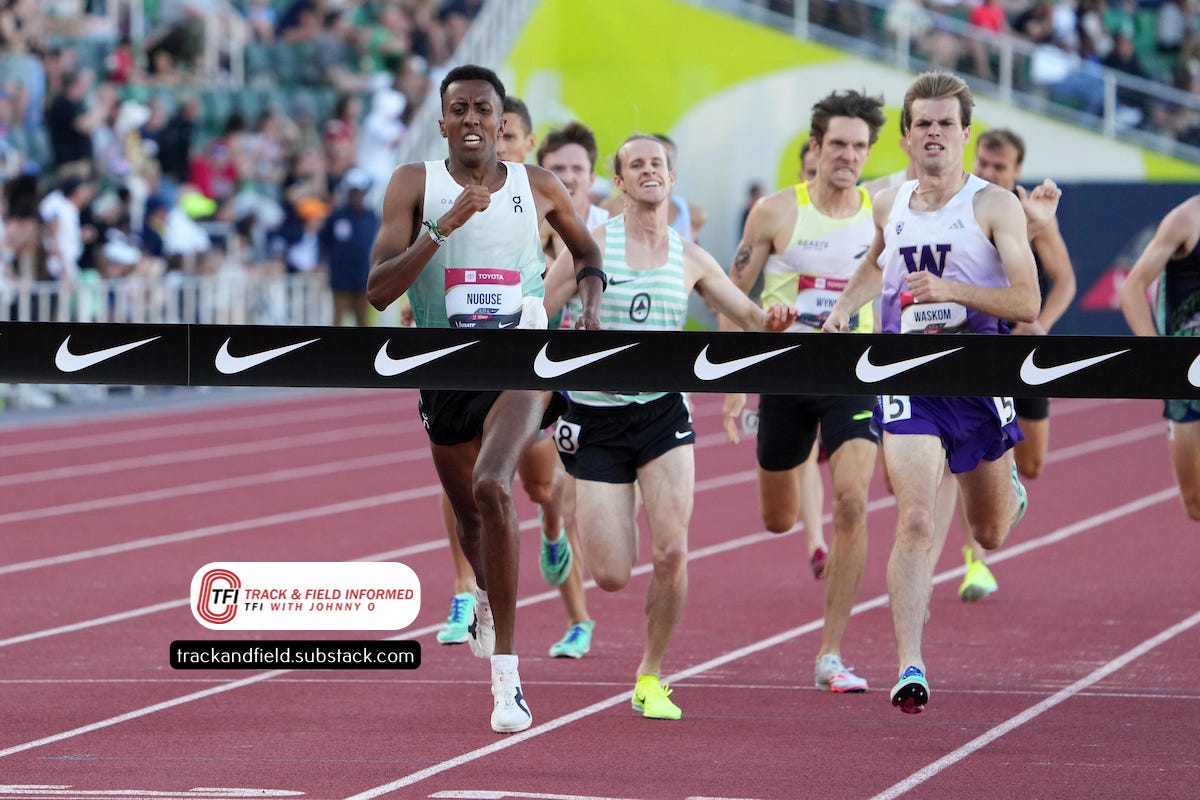
Yared Nuguse started running for fun as a teen — and he kept going for the escape it offered from the academic grind that was his true priority.
Now the 24-year-old graduate of the University of Notre Dame is in the midst of a breakout first year as a professional in which he has set American records in the men’s 1,500 meters, mile and 3,000 meters indoors and in the 1,500 outdoors.
And Nuguse is expected to contend for a medal in the 1,500 when the World Athletics Championships begin in Budapest, Hungary on Saturday.
“When I was [at Notre Dame], running was like my little escape at times,” he said. “I was never able to fully enjoy it because I would always have to come home and study for three hours. But it was a way of stepping away from the academic side of things and doing something physical that I enjoyed doing.”
Even today Nuguse is adamant that running does not consume him, that he races — and admittedly is doing it better this year than ever — because he’s still having fun. When that ends, he plans to follow his longtime dream to become an orthodontist.
“I do have higher expectations now than I did when I was younger,” Nuguse said via a Zoom call from his training base in St. Moritz, Switzerland in late July. “And I’ve had a lot of really great success early on [in my professional career]. But if anything, that success has just made me more excited about everything that’s happening. And with or without the wins and records, the fun of running is just being healthy and going out there and giving it everything you’ve got. If I can do that, I’m going to keep having fun for many more years.”
Dathan Ritzenhein, Nuguse’s coach with the Boulder, Colorado-based On Athletics Club, is a three-time U.S. Olympian who set an American record of 12 minutes 56.27 seconds in the 5,000 meters in 2009 and placed ninth in the marathon in the 2008 Olympic Games in Beijing. He wrote in an email that aside from Nuguse’s physical talent, his greatest strength is he doesn’t get too distracted by the “noise” around him.
“He stays relaxed and enjoys the racing environment and genuinely likes to see how much he can push himself. Joy in racing and getting the most out of himself is a strength that many people can’t get a full grasp on. He’s very comfortable with himself as a person and athlete so he just goes out there and does the best he can and that is fun to him. It’s very refreshing to watch as a coach.”
Nuguse, who will compete in a first-round heat of the men’s 1,500 a little after 1 p.m., Eastern Daylight Time, on Saturday, has only run eight finals — at four different distances — this year. But he has lowered his personal best in five of those races and set American indoor records of 7:28.34 in the 3,000 meters and 3:47.48 in the mile on January 27 and February 11, respectively. He also set a national indoor record in the 1,500 meters during that mile race as he came through the 1.5-kilometer mark in 3:33.22.
His other national record came in the middle of June when he placed third in the 1,500 in the Bislett Games Diamond League meet in Oslo with a time of 3:29.02 that slashed four seconds off his previous outdoor best and bettered the North American record of 3:29.30 that Bernard Lagat set in 2005.
According to a ratings system kept by World Athletics, Nuguse has produced the top six — and seven of the top eight — performances of his career this year. But Ritzenhein says his second-place finish in a high-quality 8-kilometer cross country race last December was the result that surprised him most.
“Based on his training, I didn’t think he would be our top runner that day,” Ritzenhein wrote. “It was a race that told me his fall training had been better than it showed and into the winter and spring I already knew he was going to run something special.”
Nuguse, the fourth of six children born to Ethiopian parents who met each other in Arlington, Virginia after emigrating to the United States, won the NCAA title in the 1,500 meters as a Notre Dame sophomore in 2019 before finishing second in 2021 after previously lowering the collegiate record to 3:34.68. He followed the NCAA meet with an unexpected third-place finish in the U.S. Olympic Trials to qualify for the American team that competed in the Games in Tokyo that had been delayed for a year due to the COVID-19 pandemic. However, a quadriceps injury forced him to withdraw from his first-round heat in Japan.
Nonetheless, he entered his senior outdoor track season in 2022 intent on winning a second NCAA title in the 1,500. But quadricep and hamstring issues prevented him from having much of a collegiate season, and though he ran 3:34.98 to win the 1,500 in the Portland Track Festival in Oregon on June 11, he finished 11th in the USA Track & Field Outdoor Championships 12 days later.
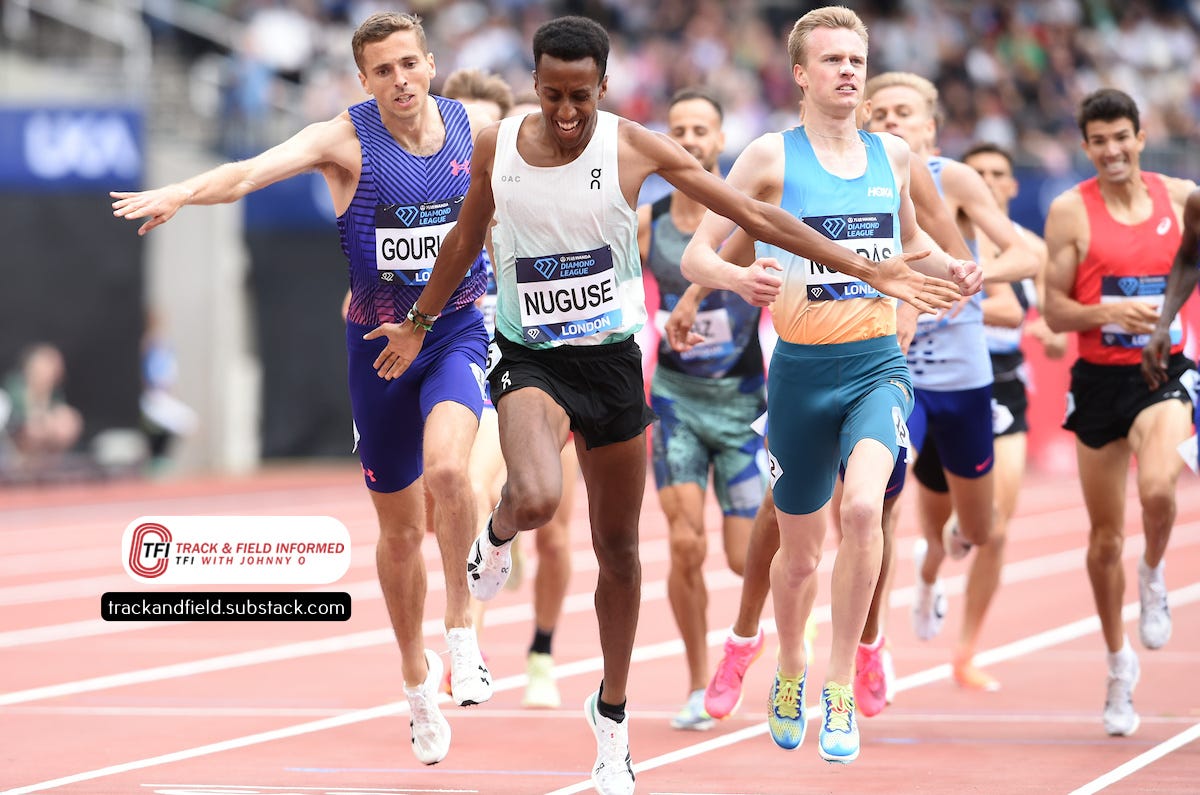
It wasn’t long after the USATF meet that Nuguse met with Ritzenhein to learn more about On Athletics Club and whether it would be a good fit for him as he continued his career at the post-collegiate level.
He became enamored with Boulder during his visit and had a good feeling about working with Ritzenhein and joining a club that also includes Spaniard Mario Garcia and Australian Olli Hoare, runners who have lowered their personal bests to 3:29.18 and 3:29.41, respectively, in the 1,500 this year.
It did not take long for Nuguse to feel like he had made the right decision to join OAC. First, he ran 3:34.95 to win the 1,500 in the Ed Murphey Classic in Memphis, Tennessee in late July of last year. Then he ran 3:36.34 and a personal best of 3:33.26 to win races in Lucerne, Switzerland on Aug. 30 and Padova, Italy on Sept. 4.
“I had a good year last year, but not the perfect year I had envisioned,” Nuguse said of 2022. “Coming off that year, I just wanted to focus on being healthy and being the runner I knew I could be. It has definitely accelerated a little faster than my expectations were initially, which is great. But I feel like I knew this has always been me. I guess I just didn’t think it’d be something I could really accomplish after one year of professional running. But it has happened and I am going along with the ride and being really happy about it.”
Tim Holman, Nuguse’s coach during his prep days at duPont Manual High, a public magnet high school in Louisville, Kentucky, is tickled with the success of his former charge. Though he admits he never could have predicted that Nuguse would run the second-fastest indoor mile in history this year.
He still recalls recruiting Nuguse to come out for the track and field team as a freshman after a physical education teacher at duPont told him Nuguse had run something like “six minutes and change” in the mile during a P.E. class the previous semester.
“He was probably 100 pounds soaking wet, and very cerebral, almost nerdy,” Holman said about Nuguse. “He mainly ran the 3,200 [meters] as a frosh, but placed something like seventh or eighth in the state meet.”
Nuguse finished eighth in 9:37.52 in the final of the Class AAA championships, which is for the largest high schools in Kentucky.
He placed third in the 1,600 in 4:16.11 as a sophomore before winning the 1,600 in 4:12.10 and finishing third in the 800 in 1:55.37 as a junior.
Holman does not recall Nuguse having a specific breakthrough race during his prep career, saying he just made steady progress every season. But he does remember Darius Payne, a senior who placed third in the 800 in the 2015 state meet pulling him aside one day and saying that Nuguse “can do a lot, Coach. He’s really good.”
A glimpse of that talent came during the 2017 state meet when Nuguse won — in the order the events were held — the 1,600 in 4:17.94, the 800 in 1:54.13, and the 3,200 in 9:19.07 while accounting for 30 of fourth-place duPont Manual’s 50 points in the team standings. His best single performance that season came a week and a half before the state championships when he ran 4:06.30 to win the Kentucky Dream Mile race by nearly 13 seconds. His time was the fastest mile ever run by a high school runner from Kentucky and it made him the 15th-fastest prep miler in the nation that year.
While Holman said Nuguse would celebrate his accolades, he didn’t dream about winning, nor place his value as a person based on his performances on the track.
He further described Nuguse as very coachable and someone who “was going to go to the well” when you gave him a hard workout.
“When you told him it was a hard day, he was going to go hard,” Holman said. “And when you told him it was an easy day, he was going to go easy. He was not someone who questioned things.”
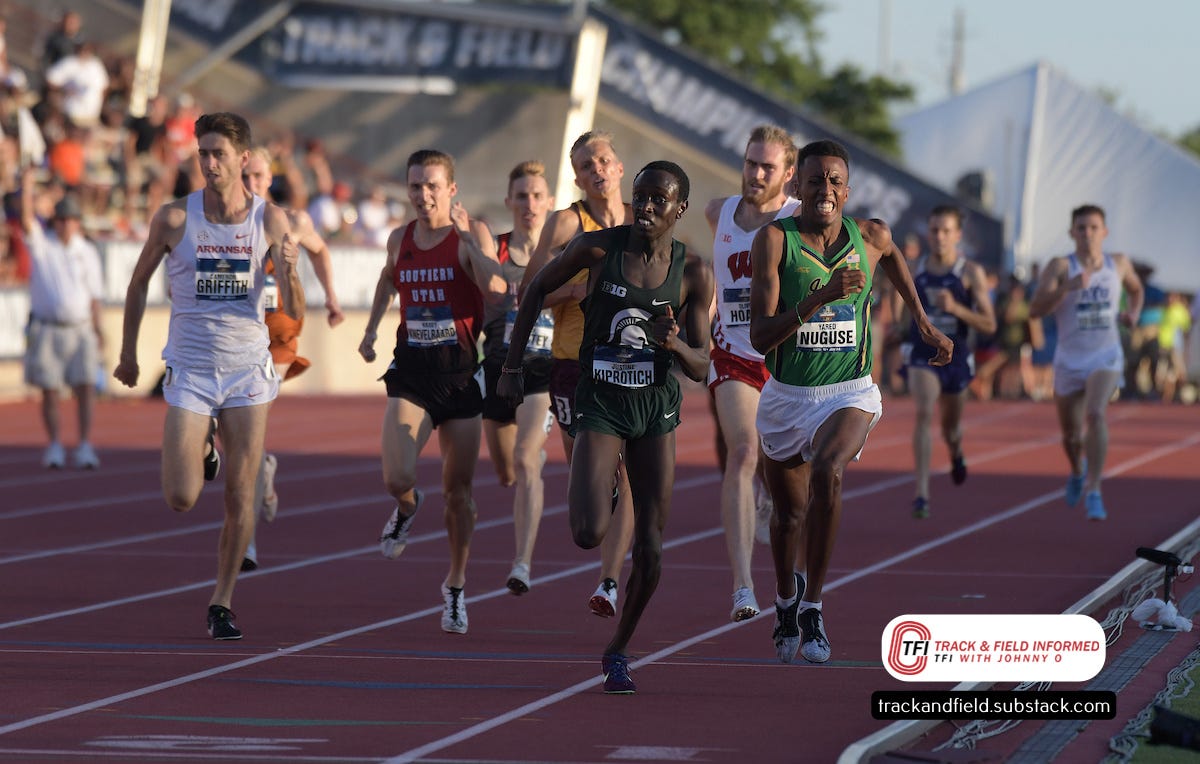
Ritzenhein agreed that Nuguse is “very easy to coach because he does not question the plan. If you tell Yared what to do he will execute the workouts and race plans. He is very easygoing in nature, but he is also very determined. So I give him the plan, and he does a very good job about getting his work in and paying attention to all the details.”
Holman would not be surprised to hear that, for he described Nuguse as extremely intelligent, pointing out that “everyone who comes to duPont is smart, but he was at another level.”
Nuguse has never been particularly interested in knowing all the pertinent statistics about his opponents. And while he is very proud of his Ethiopian heritage and the fact that his parents are from the Tigray Region in the northernmost part of the country, he is not well versed in the accomplishments of the first Ethiopian runners who helped establish the East African nation of 109 million as a world power in distance running.
When you mention individuals such as Abebe Bikila, winner of the men’s marathon in the Olympic Games in 1960 and ’64; Mamo Wolde, gold medalist in the marathon in 1968; and Miruts Yifter, winner of the 5,000 and 10,000 in 1980, Nuguse kind of chuckles and says they’re just names of people he’s heard a little bit about.
“I do know that Ethiopia has a great distance running heritage,” he said. “I mean, I see it in so many meets when it comes to the 5,000 and 10,000 meters, But the actual specifics of different runners and their history is all very foggy. I’ve seen some names and said, Oh, they have the name of one of my uncles. But it’s not like I would actually know them or their [personal records] and that doesn’t go just for them. It’s for all historical runners in general.”
While some people might argue that knowing about the history of a sport makes one more appreciative of their place in it, Nuguse thinks his naivete could be to his advantage when he lines up against the top 1,500-meter runners in the world. Although he knows and respects them, he doesn’t pay attention to their records and medal counts, he said.
“That’s just never been my thing. I know some of these people because I’ve raced them a few times, but I still see them as just a fellow competitor, rather than an idol… I think that helps me a little bit because I can worry about my own race, versus thinking about the guy in front of me, who has won three medals in major meets.”
Perhaps Nuguse’s attitude toward statistics comes from the fact he wasn’t one of those runners who dreamed of being the best in the world at a young age.
He only thought about running in college when he started to get recruited in high school and he gave little thought to running post-collegiately until his senior season at Notre Dame, well after he had set the collegiate record in the 1,500 and made the Olympic team.
Academics were always very important to him and he remembers starting the application process for dental schools during the first part of his senior year at Notre Dame so he could start working toward his goal of becoming an orthodontist once he had completed his undergraduate studies.
Although running is now a bigger part of his life, Nuguse points out that he actually has more free time now than he did when he was a student-athlete at Notre Dame working toward a degree in biochemistry.
Reading and playing video games are two things he enjoys in his spare time, but he also likes to sketch insects with charcoal pencils.
He became interested in drawing after taking a class in college. He currently has completed sketches of a ladybug, a bumblebee, a Monarch butterfly, and a praying mantis on 22- by 30-inch paper.
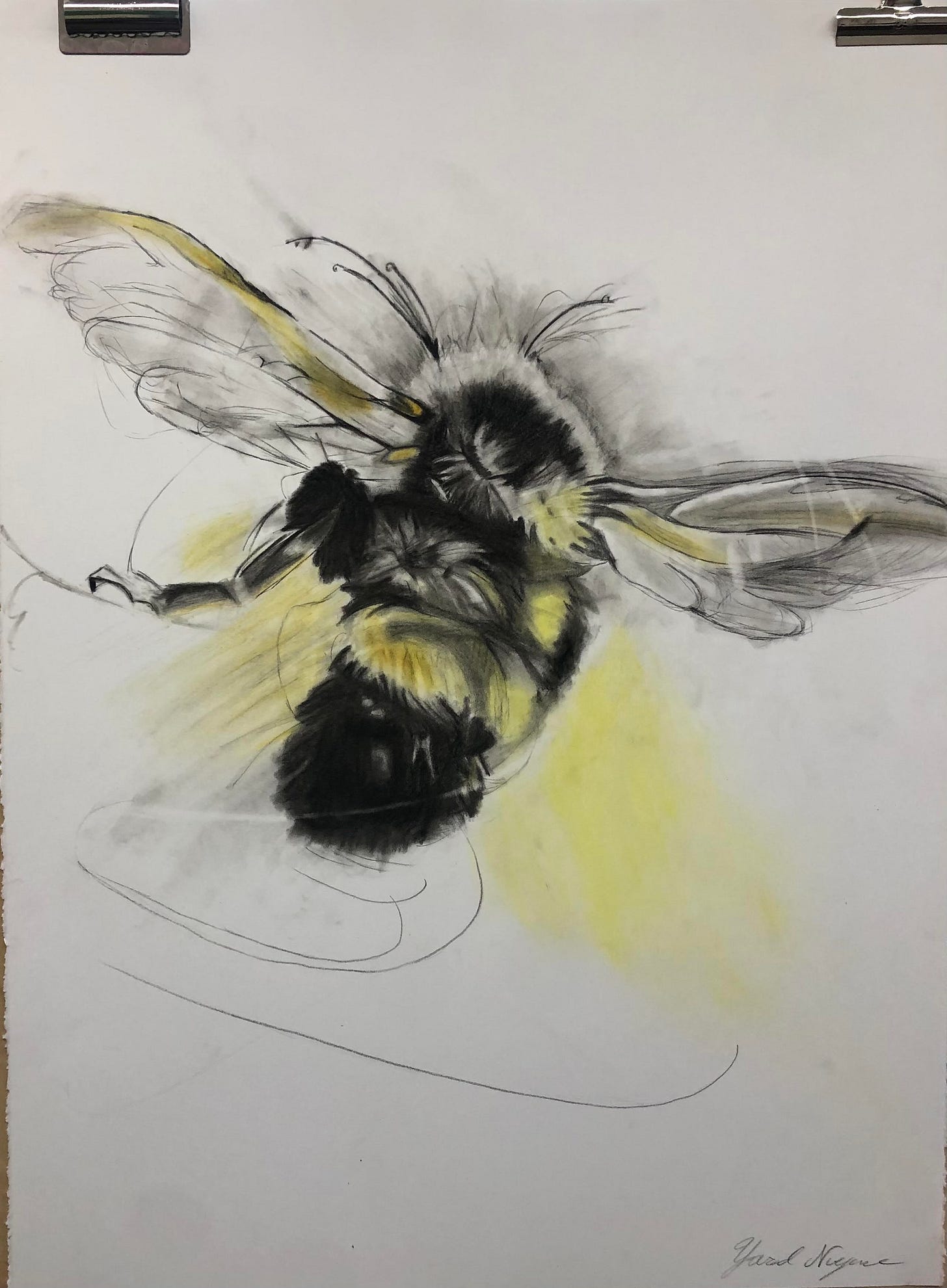
He says drawing is a release from running in the way that running used to be a release from attending classes and studying. It’s also a way of preventing him from getting overly focused on running, something he is wary of doing.
“I love running, but I love it because it’s fun for me and because I haven’t let it consume my entire life,” he said. “I like to do other things. I have other interests to pursue after I’m done running… So though I say running is cool and it’s what I’m focusing on, it’s not everything to me.”
When you ask him to name two of his strengths as a competitor, he will tell you that staying out of trouble during races is something he does very well and he also possesses a strong kick.
By avoiding trouble he means always being aware of where he is positioned during the latter portion of a race so he can react quickly if someone in front of him or around him makes a decisive move.
When it comes to his kick, he has shown the ability to run faster than most of his opponents over the final portion of his races this year.
Examples of that came in his 3:47.38 mile in the Millrose Games in New York City on February 11 and in his 3:30.44 victory in the 1,500 in the Diamond League meet in London on June 23.
He ran his last quarter-mile in 54.23 seconds in the Millrose Games to break away from Neil Gourley of Great Britain, who finished second in 3:49.46, and OAC teammate Hoare, who placed third in 3:50.83.
In London, his final race before the World Championships, Nuguse ran his final 300 meters in 40.1 seconds while turning back a field that included runner-up Narve Gilje Nordas of Norway (3:30.58) and third-place Gourley (3:30.60).
“There is something about coming to the end of the race and seeing the finish line and just giving it every last drop of what you have,” he said about his kick. “That just feels so exhilarating. And it is the best part of every race for me. I feel like I’ve been known for that for a while, but people know about it more now.”
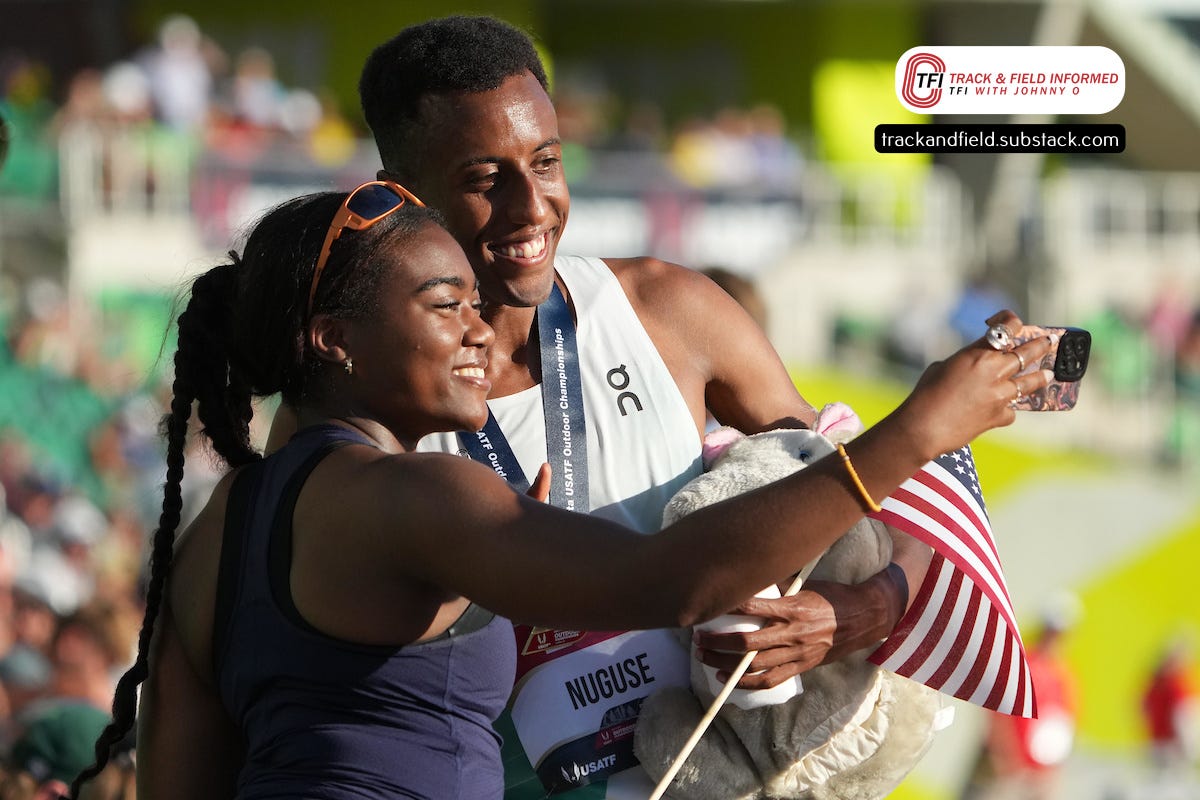
Despite his strong finish, Nuguse would like to become more aggressive during the early stages of a race so he can position himself where he wants to be sooner rather than later.
When it comes to his preferences about the 1,500 or mile, he would prefer an ”honest” pace from the start of a race, rather than cruising along for the first kilometer or three laps and letting the last 500, 400, or 300 meters turn into a mad dash for the finish line.
“If you know you’re going out to run the 1,500 or the mile, you might as well actually run the whole thing,” he said. “If I want to run like half the race fast, I would have run the 800. I really love the feeling of just accelerating and pushing the last part of races. But I think it can be done after maintaining a decent pace from the start of the race. I feel like that makes the race more worthwhile.”
Although Nuguse has displayed one of the top kicks in the world this year, no one has been able to match strides with 22-year-old Jakob Ingebrigtsen of Norway over the last 100 meters of the 1,500.
Nuguse finished second to the defending Olympic champion in a Diamond League meet in Rabat, Morocco on May 28 and he was third behind Ingebrigtsen and Mohamed Katir of Spain in the Bislett Games in Oslo when he ran his U.S. record of 3:29.02.
Ingebrigtsen, who holds the European record of 3:27.14 in the 1,500, disdains slow, tactical races in the event, and will most likely push the pace in the final of that race in the World Championships on Aug. 23. But even if he doesn’t, Ritzenhein is confident Nuguse can perform well in a slower-paced race.
“Yared has a good skill set that he can run either way,” Ritzenhein wrote. “He has typically had one of the best closing finishes in all the major races he has run this year, but he is also very strong in whatever pace the race will be. It would not surprise me if he ran a [personal record] in the final and if he does that, he will be in the hunt. But he is still incredibly fast over a more modest pace so he can go into the race knowing he is ready however it plays out.”
Nuguse is particularly excited about the World Championships because he knows it’s the meet everyone has been training for all season.
“I’m really excited to see what happens because I think the Worlds is the peak for all of us,” he said. “I am looking forward to seeing what everyone can bring since we’re all peaking for one goal.”

